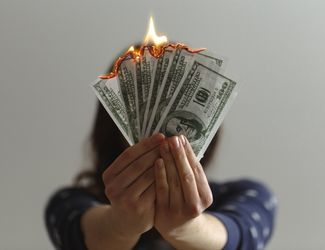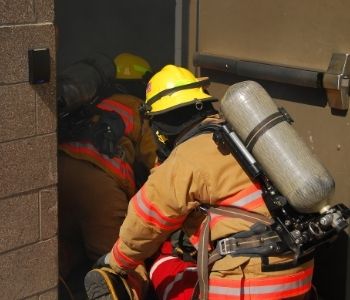Have you ever driven yourself or a loved one to a hospital because you’re afraid of incurring fees for the ambulance? Well, now a kitchen fire has broken out in your home. You evacuated everyone quickly, but you aren’t sure what to do. If you call 911 and ask for the fire department, are you going to be charged for it later?

Fire departments usually do not charge for their services unless they are private departments. If your city or town has a fire protection district, you may be charged as well. If you do have to pay, it may be as part of an annual subscription or on an as-needed basis.
In this article, we’ll talk further about when you might be charged by a fire department and how much money you might have to pay. You’re not going to want to miss it!
Table of Contents
Do Fire Departments Charge to Respond to Emergency Calls?
As far as you knew, calling 911 for the local fire department is supposed to be free. Yet a buddy of yours told you that they recently got billed by your fire department after receiving service. What gives? Do fire departments charge or not?
Municipal fire departments–such as those that receive funding through the government on a federal, state, county, or city level–usually do not charge for their services.
However, a municipal fire department might not be the one to answer your emergency call. Depending on who takes the call and responds first, you could incur fees. Let’s take a closer look at when that would be the case.
Private Fire Departments
Although there are far fewer of them than there are municipal fire departments, private fire departments do exist across the United States. It’s estimated that their numbers are only hundreds, which is roughly four percent of all firefighters in the country.
Unlike municipal fire departments, a private fire department isn’t associated with the state government on any level, from county to city levels.
Instead, they’re like any other business. When you contact them, they come to you and provide a service. You’re then expected to pay for that service.
Private fire departments are usually hired for crises such as wildfires, especially the ones that broke out across California in much of the most recent year or two. However, they can respond to calls of fires in public and private buildings as well.
Fire Protection Districts
Another instance in which you can be charged for firefighting services is if the department is in a fire protection district. These districts operate under provisions in the Fire Protection District Act.
Like private fire departments, fire protection districts are not government-owned or regulated. Instead, the district typically fills in a gap where no city or town government currently exists, but not exclusively.
Fire protection districts include a group of members elected to special roles. These people are not a city council, even if they operate like one. If your city or town has a fire protection district, the district will use property tax money.

The next time you pay your property taxes, check for a Fire Tax. If you have one, then your city or town uses a fire protection district.
Emergency Response Fees
We must also talk about emergency response fees, which you may see referred to as crash taxes, accident response fees, fire department service charges, or fire department charges.
An emergency response fee is issued by your fire department for specific services, often emergency medical care but sometimes firefighting as well.
It’s unclear if an emergency response fee applies for municipal firefighters or other subsets of firefighters, but it is something to look out for. If you’re billed after receiving help from your local fire department, this is likely an emergency response fee.
The good news is that emergency response fees have been largely done away with, as much of the country has banned them.
How Much Do Paid Fire Services Charge to Respond to Calls?
If you get in touch with a private fire department or another fire service that charges, exactly how much money should you expect to pay for these services?
That’s almost impossible to say. It could come down to a matter of geography, but even that may not be as influential as you would think.
As you’ll recall, private fire departments are non-government-regulated. Nothing is stopping them from setting firefighting prices as high as desired. Well, except the need to retain customers, that is.
Thus, you can expect that even if you are charged, the fees wouldn’t be insanely unreasonable. That’s not to say the payment would necessarily be cheap, either.
What you’ll pay for private firefighting services also depends on the payment structure the private fire department uses. Some departments will charge you for each incident, as we mentioned in the intro.
This is sort of like when you go to the doctor and you don’t have health insurance. You’re only charged for the services you receive that day.
The issue though with an as-needed payment is that your bill could be small or astronomically large. If you only have a kitchen fire, then you shouldn’t expect to be billed a lot of money. However, if most of your home burned, now that’s a different story.
Other private fire departments will charge on a subscription basis. Your fee covers private fire department services for the entire calendar year.
When you call the fire department, they don’t bill you at the time of the incident because you’re already paying a subscription. This can prevent sometimes surprising fees later when you’re already in a financial bind due to the house fire.
Of course, a subscription private fire department service is only good if you use the fire department. If you’ve never had a fire incident in your life, then you’re paying needlessly year after year.
Can You Be Charged for False Alarm Fire Department Calls?
Going back to the story of your buddy receiving a bill from the fire department, it could also be that they called and reported a false alarm fire.
False alarms are very serious. Worse yet, they’re more common than you think. The National Fire Protection Association or NFPA reports that, in 2012, firefighters across the US answered 2,238,000 false alarm fires. That’s one in 12 calls.
That number was considered a decrease too!
Although the data is a little old, it just goes to show the high rate of false alarms. Firefighters cannot tell when they’re answering a call whether someone is making up the information they’re providing. The fire department treats every call as though it’s real, and thus responds accordingly.

False alarms are a huge waste of time, manpower, energy, and gas (for the fire truck). Thus, in some neighborhoods across the country, fire departments have decided to combat the incidents of false alarm calls by charging a penalty for making them.
This usually doesn’t happen after your first call, so if you recently reported a false alarm (or your friend did), don’t sweat it too much. Instead, it usually requires several back-to-back calls for the fire department to charge you.
Should I Call My Fire Department If I Have an Emergency?
This information has certainly been some food for thought. You’d rather not get charged by your fire department if you can help it.
We agree that paying money when you don’t want to is a huge drag. However, that should never dissuade you from contacting emergency services when you need help!
Here’s an easy question for you. Would you rather pay a small fee for a private fire department to come out and save your home or hundreds of thousands of dollars to buy a new home and replace everything in it?
We think the answer to that is a no-brainer. Even those on the tightest shoestring budgets can agree that paying for private firefighting assistance is better than letting your home burn unmitigated.
Firefighting services are not always free. Private fire departments charge on an as-needed or subscription basis, fire protection districts don’t operate without money, and you can even be charged if you make too many false alarm calls to the fire department.
Even so, don’t let this information cause you to hesitate even one second when a fire breaks out in your home or workplace. Worry about the charges later and your safety now!